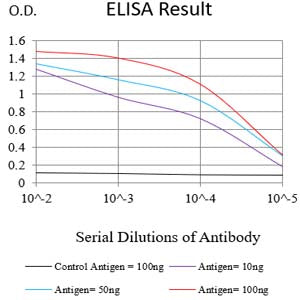
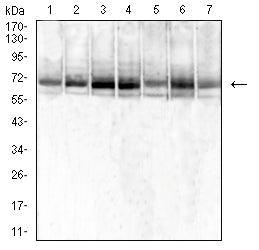
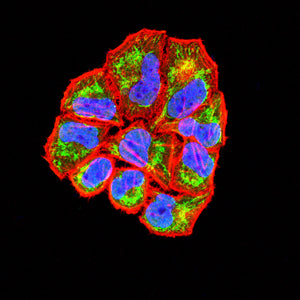
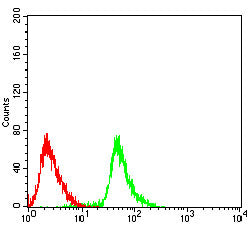
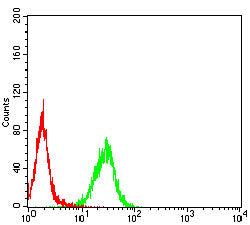
| WB | 1/500 - 1/2000 | Human,Mouse,Rat |
| IF | 咨询技术 | Human,Mouse,Rat |
| IHC | 咨询技术 | Human,Mouse,Rat |
| ICC | 1/200 - 1/1000 | Human,Mouse,Rat |
| FCM | 1/200 - 1/400 | Human,Mouse,Rat |
| Elisa | 1/10000 | Human,Mouse,Rat |
| Aliases | FP; PGL5; SDH1; SDH2; SDHF; CMD1GG; MC2DN1; NDAXOA |
| Entrez GeneID | 6389 |
| clone | 2A10F6 |
| WB Predicted band size | 72.7KDa |
| Host/Isotype | Mouse IgG2a |
| Antibody Type | Primary antibody |
| Storage | Store at 4°C short term. Aliquot and store at -20°C long term. Avoid freeze/thaw cycles. |
| Species Reactivity | Human, Mouse |
| Immunogen | Purified recombinant fragment of human SDHA (AA: 516-665) expressed in E. Coli. |
| Formulation | Purified antibody in PBS with 0.05% sodium azide |
+ +
以下是3篇关于SDHA抗体的代表性文献摘要信息,供参考:
---
1. **文献名称**: "SDHA Antibody Validation for Succinate Dehydrogenase-Deficient Tumor Diagnosis"
**作者**: Gill A.J. et al.
**摘要**: 该研究验证了SDHA抗体在免疫组化(IHC)中检测琥珀酸脱氢酶复合体缺陷型肿瘤的可靠性,发现其可作为SDHA基因突变相关副神经节瘤、胃肠道间质瘤(GIST)的有效诊断工具,并强调需结合基因检测提高准确性。
---
2. **文献名称**: "Germline mutations in SDHA are rare in paraganglioma/pheochromocytoma syndromes"
**作者**: Burnichon N. et al.
**摘要**: 通过分析嗜铬细胞瘤/副神经节瘤患者的SDHA基因突变,发现SDHA胚系突变在相关肿瘤中占比不足5%,但SDHA抗体免疫组化可作为筛选突变病例的辅助手段,与临床表型关联性较弱。
---
3. **文献名称**: "SDHA immunohistochemistry detects germline SDHA gene mutations in apparently sporadic paragangliomas and pheochromocytomas"
**作者**: Korpershoek E. et al.
**摘要**: 研究表明,SDHA抗体免疫组化可有效识别看似散发性的副神经节瘤/嗜铬细胞瘤中的SDHA突变病例,其阴性染色结果与基因突变高度一致,推荐将其纳入临床筛查流程以指导遗传咨询。
---
**备注**:如需获取具体文献全文或出版信息,建议通过PubMed或期刊官网输入标题/作者进一步查询。
SDHA antibody targets the succinate dehydrogenase complex subunit A (SDHA), a key component of mitochondrial complex II involved in both the electron transport chain and the tricarboxylic acid (TCA) cycle. SDHA catalyzes the oxidation of succinate to fumarate, coupling this reaction with the reduction of ubiquinone. As a housekeeping protein, SDHA is widely expressed across tissues, making it a common loading control in Western blotting. However, its role extends beyond metabolism; SDHA mutations or dysfunction are linked to rare hereditary cancers (e.g., paragangliomas, gastrointestinal stromal tumors) and neurodegenerative disorders.
SDHA antibodies are essential tools for studying SDHA expression, localization, and interactions in disease models. They are used in techniques like immunohistochemistry (IHC), immunofluorescence (IF), and immunoprecipitation (IP) to assess protein levels, mitochondrial integrity, or pathogenic variants. Validating these antibodies is critical due to potential cross-reactivity with other dehydrogenase subunits (e.g., SDHB) or isoforms. Researchers often confirm specificity using SDHA-knockout cell lines or siRNA knockdown. Commercial SDHA antibodies are typically raised in rabbits or mice against peptide sequences unique to the SDHA protein.
Recent studies highlight SDHA’s dual role as a metabolic enzyme and tumor suppressor, driving interest in its therapeutic targeting. Reliable SDHA antibodies are thus vital for advancing cancer research and mitochondrial disease diagnostics.
×